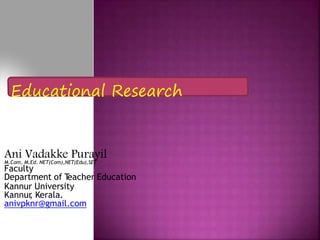The document outlines the nature of educational research, defining the term and its characteristics while differentiating between various types of research methodologies such as fundamental, applied, correlational, action, and experimental research. It emphasizes the systematic and structured approach to generating knowledge, including the importance of hypotheses, conceptual frameworks, and methodological principles in conducting research. Additionally, it discusses the relevance and application of educational research in understanding societal behaviors and trends, as well as the practical implications of its findings.































